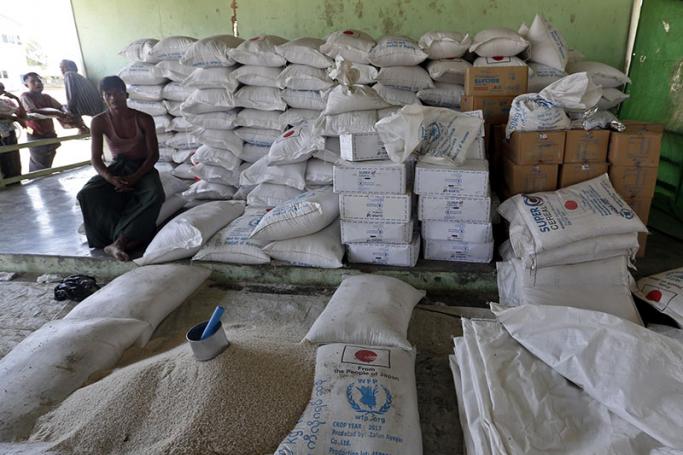The World Food Programme has suspended food aid in Myanmar's violence-scorched Rakhine State, as the humanitarian situation deteriorates with a surging death toll and tens of thousands -- both Rohingya Muslims and ethnic Buddhists -- on the move.
Relief agencies, including WFP, have repeatedly been accused by Myanmar authorities of allowing their rations to fall into the hands of ARSA terrorists, whose attacks on police posts on August 25 sparked the current violence.
Around 120,000 people - most of them Rohingya Muslim civilians - have relied on aid hand-outs in camps since 2012, when religious riots killed scores and sparked a crisis which is again burning through the state.
Nearly 60,000 people have fled to Bangladesh, according to the United Nations.
“The estimated number is 58,600 (as of) today (September 2) according to various aid agencies and will keep going up," UNHCR spokeswoman Vivian Tan told AFP.
Over the last five years Rakhine State has been cut along ethnic and religious lines, but the current violence is the worst yet.
Aid agencies are routinely accused of a pro-Rohingya bias and the sudden flare-up of unrest has renewed safety concerns, prompting relief work to be pulled back.
"All WFP food assistance operations in Rakhine State have been suspended due to insecurity... affecting 250,000 internally displaced and other most vulnerable populations," the WFP said in a statement.
"We are coordinating with the authorities to resume distributions for all affected communities as soon as possible, including for any people newly affected by the current unrest."
The Rohingya, branded illegal immigrants in Myanmar and mostly denied citizenship, make up the vast majority of the dead and displaced since 2012.
Tens of thousands have been turned away by Bangladeshi border officials, while scores have died trying to cross the Naf river -- which divides the two countries -- in makeshift boats and even on flotsam.
(APF)
You are viewing the old site.
Please update your bookmark to https://eng.mizzima.com.
Mizzima Weekly Magazine Issue...
14 December 2023
Spring Revolution Daily News f...
13 December 2023
New UK Burma sanctions welcome...
13 December 2023
Spring Revolution Daily News f...
12 December 2023
Spring Revolution Daily News f...
11 December 2023
Spring Revolution Daily News f...
08 December 2023
Spring Revolution Daily News f...
07 December 2023
Diaspora journalists increasin...
07 December 2023
Local Shan people call for their identity to be added to signboard












